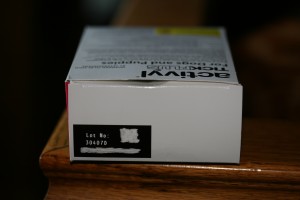As we’ve gotten our website up and running, and hopefully (but not likely) worked out the bugs and mispellings, our practice has discussed the blog feature offered to us with our site. The big questions we’ve all had were “can we blog”, “how should we blog”, “what should be blog about”, and “who should blog”?
Some of the answers were easy, and some not so much. Collectively, the doctors and staff of Camillus Animal Clinic attend hundreds of hours of continuing education per year, so the obvious answer was “let’s share some of what we’ve learned and are excited to offer to our patients”. We’ve talked about letting Wonka’s adoring public know what a day in his life is like, we’ve talked about expounding about timely items affecting our pets that people may not think about, and we’ve talked about what we can educate people about which will help their pets live long and healthy lives. So, over the weeks and months to come, look for all of that. Dr. Laxen is putting the finishing touches on some information about heartworm disease, Dr. Clifford just returned from a seminar on dental care, and our techs will be sharing some information on nutrition. Who knows what else may appear!
To kick things off, I’m going to climb up on my soap box and talk two things which have cropped up in the past few weeks. The first of these is an adverse reaction to a flea and tick product. This is a product which we carry, but which was not purchased from our clinic. While there are all kinds of products available through internet commerce, not all products have been designed to be sold in this fashion, and most veterinary products carry statements on the package inserts that the guarantee associated with said product is valid only if the product was purchased through a licensed veterinarian. Many products are sold only through licensed vets; when these products appear on the internet, they are often items which are not labeled for sale in the United States or are products which have been stolen or diverted from the original veterinary purchaser. The product in question was one of these products–purchased through the “marketplace” of a reputable online resource, this product came to our client with the label identifiers scratched out by the seller.
Had this product been purchased from us, or from another licensed veterinarian, the manufacturer would have stood by the product. Their warranty allows for not only refunds of the product, but assistance in veterinary care necessitated by the reaction. Unfortunately for our client, as this product was purchased from an online seller, they were out both the purchase price and the cost of the care needed after application. All of the products we carry at our office have either been purchased directly from the manufacturer or through one of their authorized distributers; we can be certain that all products are as labeled and are handled appropriately–this helps us to ensure safety for your pet. Please ask one of us if you have questions on this, and we’d be happy to talk with you about it.
The second thing I’d like to mention is that we’re deep in the season for baby wildlife. The little guy (or gal) below was spotted by my brother-in-law on the bank between the family house and Tully Lake.
If you find a fawn, or a nest of rabbits, or a baby bird out of its nest, please resist the urge to pick it up and nurture it! Animal babies are rarely abandoned by their mothers–most often, Mom is waiting in the wings for you to go away away so they can tend to their offspring. If you find what you believe to be an orphaned wild animal, please call our office or the Department of Environmental Conservation for information on licensed wildlife rehabilitators as these animals have a much better chance of survival if we are not messing with them.
If you’ve got something you’d like to hear about, or if you’ve got a particular staff member you’d like to hear from, please let us know! We’ll try to publish as time allows, always keeping in mind that patient care is our number one priority.
Dr. Otto


